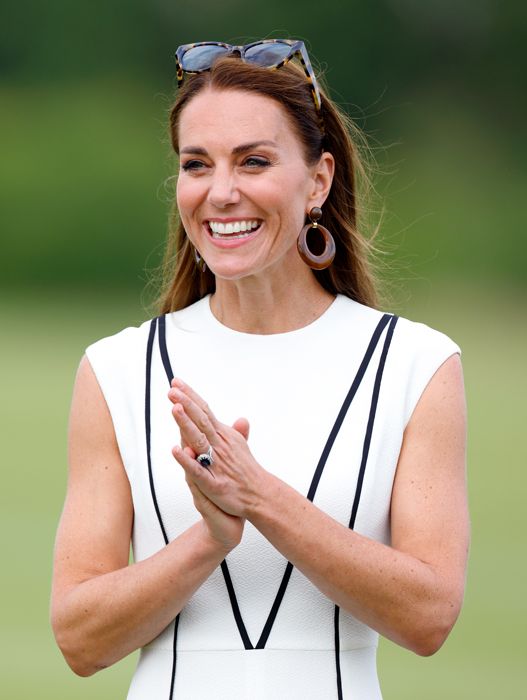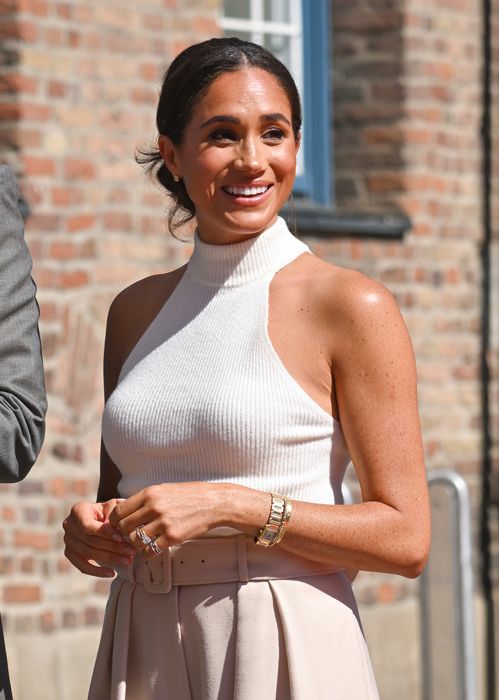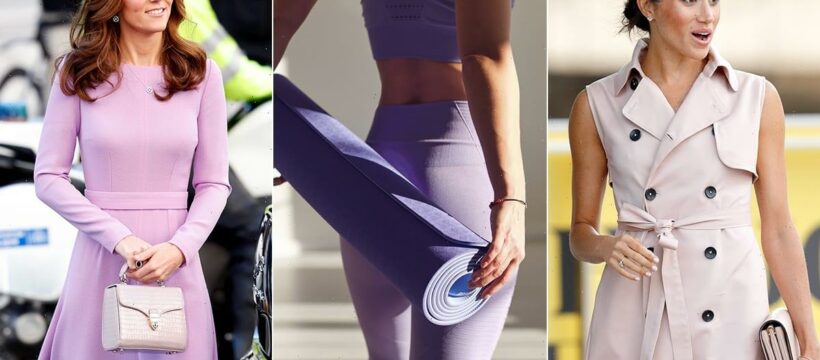Pilates is the royal-approved workout on everyone’s lips, loved for its low-intensity sequences and unrivalled results for muscle tone and improved posture.
Meghan Markle previously described megaformer Pilates as “hands down the best thing you could do for your body,” while the Princess of Wales is also believed to have taken up the holistic workout in order to build up her strength following the birth of her children, Prince George, Princess Charlotte and Prince Louis.
Think you can handle a royal workout? See what happened when I took on Princess Kate’s intense exercise regime in the clip below…
Princess Beatrice’s former personal trainer recommended Pilates as the ultimate pre-wedding workout to tone up ahead of your big day, while Lady Amelia Windsor, the distant cousin of Princes William and Harry, is a regular in London’s boutique Pilates studio Core Collective.
So what is the real reason so many royals and A-listers are flocking to take up Pilates? HELLO! spoke to Chloe Burton, a trainer at London Reformer Pilates, who revealed exactly why this 100-year-old body conditioning class has become so popular.
Everything you need to know about Pilates
Remember when Princess Kate’s insanely toned arms dominated headlines back in July? The royal cheered on Prince William from the sidelines as he took part in a charity polo match – and her defined biceps and deltoids were such a surprise to royal fans that ‘Kate’s arm muscles’ started trending on Twitter.

The Princess of Wales’ toned arms caused a stir
“Pilates not only lengthens and strengthens your muscles but gives you mobility and flexibility in your body,” says Chloe.
The majority of Pilates uses nothing but body weight, with the occasional use of additional light weights to increase strength. “Traditional Pilates exercises focus on the core, glutes and back, so it would not be uncommon to find these muscles are more visibly stronger in Pilates clients.
“Adding hand-held weights for arm exercises will definitely help to create the ‘toned’ look,” says Chloe. Noted!
Can anybody do Pilates?
If you’re nervous about booking your first Pilates class, don’t be. Pilates is not limited by age or ability. Though the original exercises may be tricky to master, your instructor can always make adjustments to the movements.
“Pilates is largely beneficial in helping with the prevention of falls and injuries due to its nature of stabilising and mobilising your joints,” says Chloe.

Reformer Pilates classes offer a full body burn
Princess Eugenie and Beatrice’s mother Sarah Ferguson, 63, credited Pilates for her 42lb weight loss back in 2014, having loved the low-intensity, results-driven classes.
“There is always the option to participate in reformer or mat classes no matter your age,” adds Chloe.
How long does it take to notice a physical difference from regular Pilates exercise?
Joseph Pilates himself stated: “You will feel better in ten sessions, look better in twenty sessions, and have a completely new body in thirty sessions.”
According to Chloe, if you did 2/3 sessions a week, you’re looking at around 10-12 weeks to see a physical difference. “Bear in mind though that your diet, daily movement and other lifestyle factors will determine the rate of your progression.”

The Duchess of Sussex is a longtime fan of Pilates
The Duchess of Sussex had her own opinion on this. “Your body changes immediately… give it two classes and you will see a difference,” she said of her favourite megaformer Pilates classes, which are renowned for being slightly more intense than a regular mat-based class.
If you’re after a more intense workout, Lady Amelia Windsor’s electromagnetic ‘space suit’ workout might interest you. Take a look in the video below…
WATCH: What really happens during this bizarre royal workout
Is Pilates a safe exercise for someone to tone up postpartum?
Princess Kate’s sister Pippa Middleton has been a fan of Pilates since her twenties.
The mother-of-three once left a testimonial on the website of a small Pilates studio in Parson’s Green, crediting the workout as a “wonderful escape” from her busy London lifestyle.
Sporty Pippa, who showed off her enviable abs in a bikini in St Bartes last month, also favoured low-intensity exercises in order to regain her strength after giving birth.
“Pilates postpartum can be very beneficial and safe in aiding recovery from pregnancy and birth,” says Chloe. “Pilates is a low-impact class which focuses heavily on strengthening the core and surrounding muscles, those of which tends to be weakened during pregnancy.

Pilates is a great way to build up core strength following pregnancy
“The pelvic floor will be strengthened, posture realigned, joint pain eased as weak as helping to manage stress and give you time for yourself.”
How do Reformer Pilates classes differ from ‘normal’ Pilates?
Chloe explains that Reformer classes use the moving carriage and springs to add resistance, whereas mat Pilates uses just your bodyweight.
While the mat can be great for beginners to learn the foundations of Pilates, the Reformer is what really gives you the burn. “I’d encourage trying both methods of Pilates as they offer you different styles of training,” she says.
If you’re looking to get started in this royally loved workout, Chloe is one of the trainers at the newly-opened London Reformer Pilates studio in Marylebone. New members can trial three classes for just £49.
MORE FITNESS:
11 sports bras with the best reviews: From Marks & Spencer to Lululemon
Sustainable gym wear: 7 best eco-friendly brands to add to your eco wardrobe
Best fitness gifts for active friends or relatives who just love working out
Source: Read Full Article
